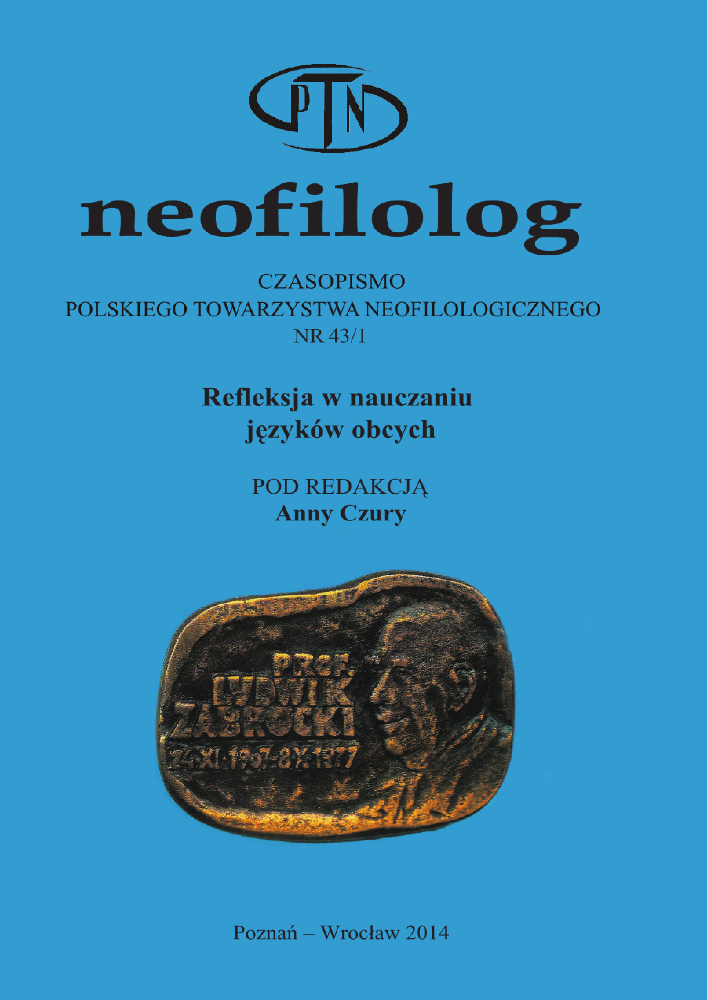Abstract
This article aims to discuss the problem of a relationship between reflection and identification in the community of EFL teaching practitioners. The basic tenet is that reflection enables individuals to construct and supply reification to community knowledge, which, in turn, allows for their identification as legitimate members of the community. Identity is neither static nor pre-given. It is built as one moves through life and changes according to one’s environmental needs, one’s interests and interactions. To expound and exemplify these tenets, two samples of conversations in a community of language teaching practitioners are analyzed. The analysis aspires to reveal a dialectic relationship between the processes of reflection and identification.References
Bamberg, M. 2000. „Critical personalism, language, and development”. Theory & Psychology 10: 749-767.
Bamberg, M. 2011. „Narrative discourse” (w:) The Encyclopedia of Applied Linguistics (red. C. A. Chapelle). Oxford: Wiley-Blackwell: 4157-4163.
Beck, U. 2002. Społeczeństwo ryzyka. W drodze do innej rzeczywistości. Przeł. S. Cieśla. Warszawa: Wydawnictwo Naukowe Scholar.
Bendkowski, J. 2012. Interaktywno-sieciowy model kształtowania wspólnot działań w kreowaniu i dyfuzji wiedzy w organizacjach. Gliwice: Wydawnictwo Politechniki Śląskiej.
Bokszański, Z. 1989. Tożsamość, integracja, grupa. Łódź: Wydawnictwo Uniwersytetu Łódzkiego.
Brazelton, J. i G. A. Gorry. 2003. „Creating a knowledge sharing community: If you build it, will they come?”. Communications of the ACM 3(1): 23-25.
Cackowski, Z. 1992. „Przeszkoda epistemologiczna”. Kwartalnik Pedagogiczny 1(141): 3-14.
Enkel, E., P. Heinold, J. Hofer-Alfeis i Y. Wicky. 2002. „The power of communities: How to build knowledge management on a corporate level using a bottom-up approach” (w:) Knowledge Management Case Book: Siemens Best Practices (red. T. Davenport i G. J. B. Probst). New York: Wiley & Sons: 108-127.
Erikson, E. H. 1968. Identity, Youth and Crisis. New York: Norton and Co.
Gabryś-Barker, D. 2012. Reflectivity in Pre-service Teacher Education. A Survey of Theory and Practice. Katowice: Wydawnictwo Uniwersytetu Śląskiego.
Gach, D. 2007. „Wspólnoty praktyki” (w:) Podstawy zarządzania przedsiębiorstwem w gospodarce opartej na wiedzy (red. B. Mikuła, A. Pietruszka-Ortyl i A. Potocki) Warszawa: Difin: 251-254
Gee, J. P. 2010. Introduction to Discourse Analysis: Theory and Method (3rd ed.). London: Routledge.
Giddens, A. 1991. Modernity and Selfidentity. Cambridge, MA: Polity Press.
Jenkins, R. 2008. Social Identity (3rd ed.). London: Routledge.
Kubiak, K. 2008. „Lokalne i globalne wspólnoty praktyków w przedsiębiorstwie sektora high-tech” (w:) Scenariusze, dialogi i procesy zarządzania wiedzą (red. K. Perechuda i M. Sobińska) Warszawa: Difin.
Kwiatkowska, H. 2005. Tożsamość nauczycieli. Między anomią a autonomią. Gdańsk: GWP.
Lave, J. i E. Wenger. 1991. Situated Learning: Legitimate Peripheral Participation. Cambridge: Cambridge University Press.
Lortie, D. C. 1975. Schoolteacher: A Sociological Study. Chicago: University of Chicago Press.
Mead, G. 1934. Mind, Self and Society. Chicago: The University of Chicago Press.
Schön, D. A. 1983. The Reflective Practitioner. How Professionals Think in Action. New York: Basic Books Inc.
Scollon, R. i S. W. Scollon. 2001. Intercultural Communication. A Discourse Approach (2nd ed.). Oxford: Wiley-Blackwell.
Tajfel, H. 1982. Social Identity and Intergroup Relations. Cambridge: Cambridge University Press.
Tajfel, H. i J. C. Turner. 1979. „An integrative theory of intergroup conflict” (w:) The Social Psychology of Intergroup Relations (red. W. G. Austin i S. Worchel). Monterey, CA: Brooks/Cole: 33-47.
Wenger, E. 1998. Communities of Practice. Learning, Meaning and Identity. Cambridge: Cambridge University Press.
License
Copyright (c) 2019 Neofilolog

This work is licensed under a Creative Commons Attribution-NoDerivatives 4.0 International License.
Authors
Authors of texts accepted for publication in Neofilolog are required to complete, sign and return to the Editorial team’s office the Agreement for granting a royalty-free license to works with a commitment to grant a CC sub-license.
Under the agreement, the authors of the texts published in Neofilolog grant Adam Mickiewicz University in Poznań a non-exclusive, royalty-free license and authorize the use of Attribution-NoDerivatives 4.0 International (CC BY-ND 4.0) Creative Commons sub-license.
The authors retain the right to the free disposal of the work.
Users
Interested Internet users are entitled to use works that have been published in Neofilolog since 2017, under the following conditions:
▪ attribution – obligation to provide, together with the distributed work, information about the authorship, title, source (link to the original work, DOI) and the license itself.
▪ no derivatives – the work must be preserved in its original form. Without the author's consent, it is not possible to distribute the modified work in the form of translations, publications, etc.
Copyrights are reserved for all texts published since 2017.
Miscellaneous
Adam Mickiewicz University in Poznań retains the property right as a whole (layout, graphic form, title, cover design, logo etc.).
